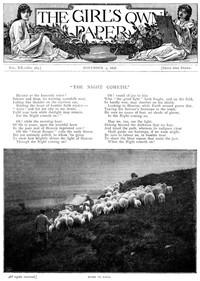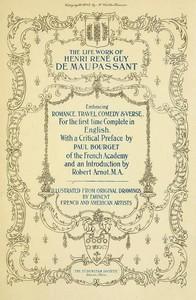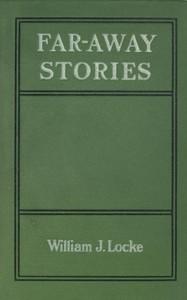Read this ebook for free! No credit card needed, absolutely nothing to pay.
Words: 47480 in 26 pages
This is an ebook sharing website. You can read the uploaded ebooks for free here. No credit cards needed, nothing to pay. If you want to own a digital copy of the ebook, or want to read offline with your favorite ebook-reader, then you can choose to buy and download the ebook.
effort to rescue a baby sister, he had fallen headforemost into a great wood fire, and when they picked him up his face "was like unto a charred log that had long smouldered." Almost the semblance of humanity had been wiped from him, and to all beholders he became a thing of horror. Men turned their heads away, women shivered and children screamed at his approach. He was a pariah, condemned from early boyhood to an awful loneliness. His parents, a certain Sir Julius Wendover, Baronet, and his wife, his elder brother and his sisters--they must have been a compassionless family--turned from him as from an evil and pestilential thing. Love never touched him with its consoling feather, and for love the poor wretch pined his whole youth long. Human companionship, even, was denied him. He seems to have lived alone in a wing of a great house, seldom straying beyond the bounds of the park, under the tutorship of a reverend but scholarly sot who was too drunken and obese and unbuttoned to be admitted into the family circle. This fellow, one Doctor Tubbs, of St. Catherine's College, Cambridge, seems to have shown Jeremy some semblance of affection, but chiefly while in his cups, "when," as Jeremy puts it bitterly, "he was too much like unto the beasts that perish to distinguish between me and a human being." When sober he railed at the boy for a monster, and frequently chastised him for his lack of beauty. But, in some strange way, in alternate fits of slobbering and castigating, he managed to lay the groundwork of a fine education, teaching Jeremy the classics, Italian and French, some mathematics, and the elements of philosophy and theology; he also discoursed much to him on the great world, of which, till his misfortunes came upon him, he boasted of having been a distinguished ornament; and when he had three bottles of wine inside him he told his charge very curious and instructive things indeed.
So Jeremy grew to man's estate, sensitive, shy, living in the world of books and knowing little, save at second-hand, of the ways of men and women. But with all the secrets of the birds and beasts in the far-stretching Warwickshire park he was intimately acquainted. He became part of the woodland life. Squirrels would come to him and munch their acorns on his shoulder.
"So intimate was I in this innocent community," says he, not without quiet humour, "that I have been a wet-nurse to weasels and called in as physician to a family of moles."
When Sir Julius died, Jeremy received his younger son's portion and was turned neck and crop out of the house by his ill-conditioned brother. Tubbs, having also suffered ignominious expulsion, persuaded him to go on the grand tour. They started. But they only got as far as Abbeville on the road to Paris, where Tubbs was struck down by an apoplexy of which he died. Up to that point the sot's company had enabled Jeremy to endure the insult, ribaldry and terror that attended his unspeakable deformity; but, left alone, he lost heart; mankind rejected him as a pack of wolves rejects a maimed cub. Stricken with shame and humiliation he crept back to England and established himself in the maltster's house at Bullingford, guided thither by no other consideration than that it had been the birthplace of the dissolute Tubbs. He took up his lonely abode there as a boy of three-and-twenty, and there he spent the long remainder of his life.
The great event happened in his thirty-fourth year. You may picture him as a solitary, scholarly figure living in the little Tudor house, with its mullioned windows, set in the midst of an old-world garden bright with stocks and phlox and hollyhocks and great pink roses, its southern wall generously glowing with purple plums. Indoors, the house was somewhat dark. The casement window of the main living-room was small and overshadowed by the heavy ivy outside. The furniture, of plain dark oak, mainly consisted of bookcases, in which were ranged the solemn, leather-covered volumes that were Jeremy's world. A great table in front of the window contained the books of the moment, the latest news-sheets from London, and the great brass-clasped volume in which he wrote his diary. In front of it stood a great straight-backed chair.
You may picture him on a late August afternoon, sitting in this chair, writing his diary by the fading light. His wig lay on the table, for the weather was close. He paused, pen in hand, and looked wistfully at the mellow eastern sky, lost in thought. Then he wrote these words:
He closed and clasped the book with a sigh, put on his wig, rose and, going into the tiny hall, opened the kitchen door and announced to his household, one ancient and incompetent crone, his intention of taking the air. Then he clapped on his old three-cornered hat and, stick in hand, went out of the front gate into the light of the sunset. He stood for a while watching the deep reflections of the alders and willows in the river and the golden peace of the meadows beyond, and his heart was uplifted in thankfulness for the beauty of the earth. He was a tall, thin man, with the stoop of the scholar and, despite his rough, country-made clothes, the unmistakable air of the eighteenth-century gentleman. The setting sun shone full on the piteous medley of marred features that served him for a face.
A woman, sickle on arm, leading a toddling child, passed by with averted head. But she curtsied and said respectfully: "Good evening, your honour." The child looked at him and with a cry of fear shrank into the mother's skirts. Jeremy touched his hat.
"Good evening, Mistress Blackacre. I trust your husband is recovered from his fever."
"Thanks to your honour's kindness," said the woman, her eyes always turned from him, "he is well-nigh recovered. For shame of yourself!" she added, shaking the child.
"Nay, nay," said Jeremy kindly. "'Tis not the urchin's fault that he met a bogey in broad daylight."
He strolled along the river bank, pleased at his encounter. In that little backwater of the world where he had lived secluded for ten years folks had learned to suffer him--nay, more, to respect him: and though they seldom looked him in the face their words were gentle and friendly. He could even jest at his own misfortune.
Free books android app tbrJar TBR JAR Read Free books online gutenberg
More posts by @FreeBooks

: The Girl's Own Paper Vol. XX No. 984 November 5 1898 by Various - Children's literature Periodicals The Girls Own Paper


: Notre Coeur; or A Woman's Pastime: A Novel by Maupassant Guy De - France Fiction; Man-woman relationships Fiction; Love Fiction








